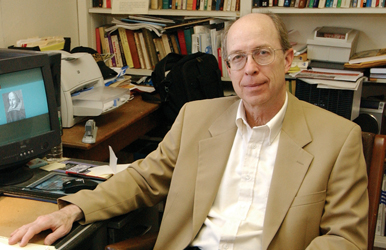Shakespeare’s rough voyage to America
William Carroll gives keynote address to Shakespeare Association

William Carroll recently explained to a fascinated audience how William Shakespeare came to America. No, the Bard, who died in 1616, didn’t make the transatlantic voyage in the flesh, but his plays landed safely in the New World during colonial times and in the Revolutionary War era.
- Carroll, a College of Arts and Sciences professor of English, was the honored speaker at the annual meeting of the Shakespeare Association of America in Philadelphia on April 14, where he delivered the presidential address. The outgoing president of the association for the 2005-2006 academic year focused his talk on Shakespearean plays that were performed in America during the 18th century — and specifically in Philadelphia, which was the largest American city at the time and played a crucial role in the formation of theater on the continent.
“Philadelphia in the 1700s was one of the very few places on the vast, nearly empty American continent where a culture of theater could be established,” said Carroll, director of graduate studies in the English department. “It’s not enough to have playwrights and actors, though both of those were also in short supply, but a living theater needs a dependable audience, which in turn means an adequate density of citizens who to a greater or lesser extent share enough values to be able to join together occasionally in the communal ritual of going to the theater. This meant, in practice, that only Boston, New York, and Philadelphia could have been expected to sustain such an enterprise at this time.”
Carroll believes that it’s safe to say that Shakespeare was banned in Boston at the time because of this city’s Puritan ethos. But it’s not as if early politicians were overly receptive to theater in the City of Brotherly Love, either. Although The Merchant of Venice was performed by Lewis Hallam and his London Company of Comedians in Philadelphia in 1754 — and the first American professional production of Hamlet took place there in 1759 — theaters were widely regarded as dens of iniquity. The first Continental Congress, which met in Philadelphia in 1774, passed a law that forbade public entertainment. Nonetheless, American army officers performed plays in the city’s Southwark Theatre in 1778, prompting Congress to pass a resolution suppressing “theatrical entertainments, horse racing, and gaming, and other such diversions as are productive of idleness, dissipation, and a general depravity of principles and manners.”
The following year the Pennsylvania state legislature prohibited the building of “any playhouse, theatre, stage or scaffold for acting, showing or exhibiting any tragedy, tragic-comedy, farce, interlude or any other part of a play whatsoever.”
Revolutionary resistance to importing British culture is understandable. After all, between 1778 and 1783, in areas under English rule in New York and Philadelphia, the British military theater performed King Henry IV, King Lear, Othello, Macbeth, and Richard III, among others. Still, at the same time, in regular theaters not under British control in Annapolis and Philadelphia, the same plays were staged. For the colonists, the choice of most of these plays “seems logical enough, as many deal with the imposition of tyranny and the resistance struggle for liberty,” says Carroll.
For those on both sides of the war, perhaps, the plays were meant to inspire their causes — or maybe they provided escapism. “Did the British soldiers, when they saw Henry IV, see the Americans in Hotspur and draw strength in his defeat?” wondered Carroll. “Did the American soldiers, when they saw the play, see the British in a weak King Henry or a crazed Glendower? That both armies performed this same play still puzzles me.”
What is certain, however, is that the British lost the war, but Shakespeare and the theater gained a permanent foothold on this side of the Atlantic. “As we might expect,” said Carroll, the prohibitions were “failures even as they were enunciated, and were eventually withdrawn.”